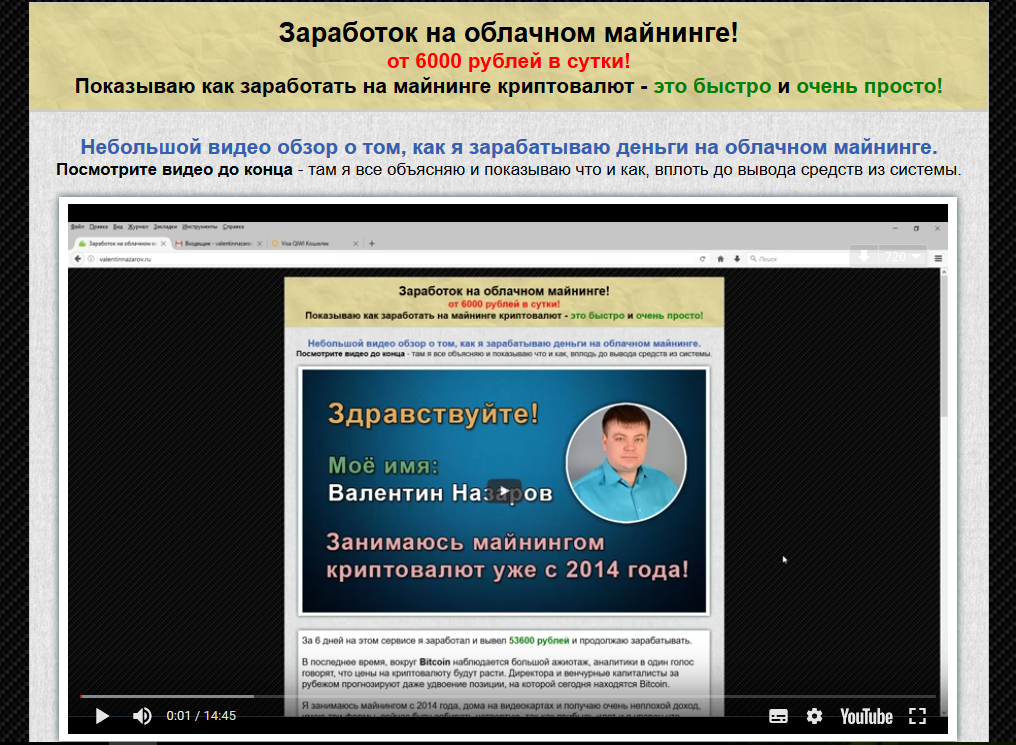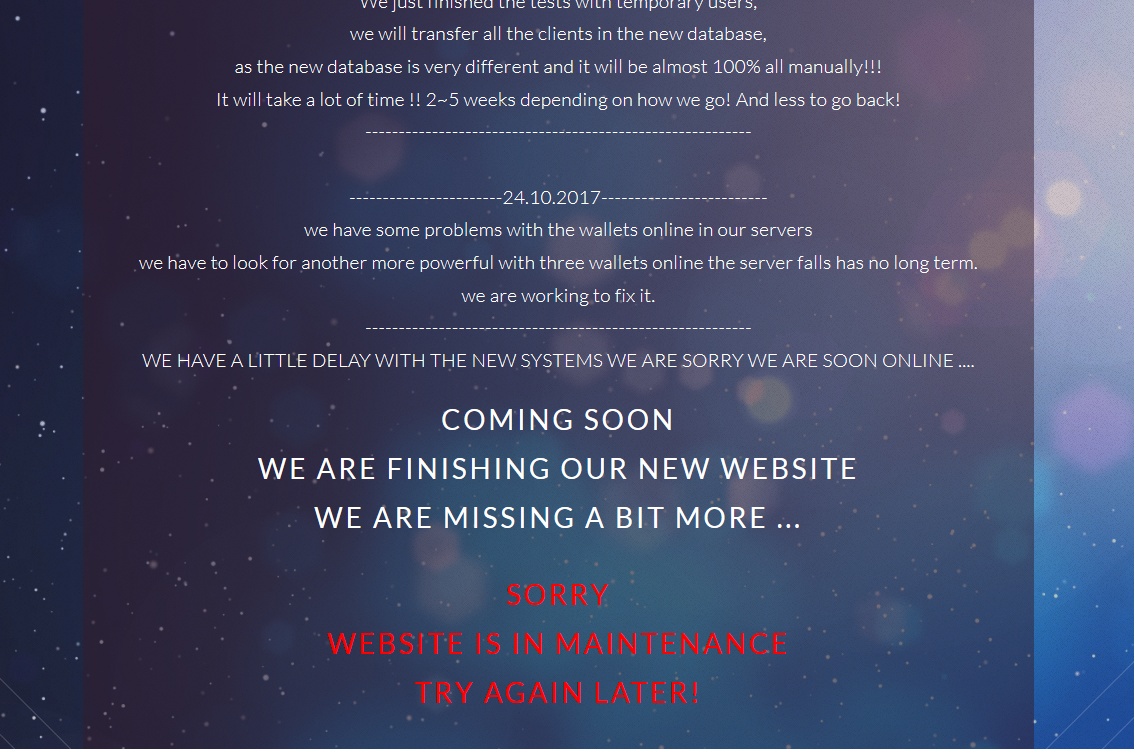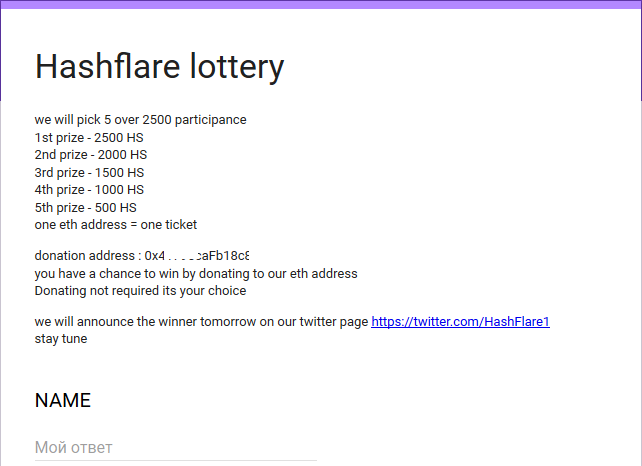Cloud scam: how scammers try to impersonate HashFlare and sell non-existent services
The rapid development of the crypto market opens up a lot of opportunities to earn on its growth almost without investments and SMS. The easiest way is to buy bitcoin and wait until it grows in price. Profit! Such a simple way made millionaires already many millionaires. A bit harder is to start Bitcoin (or another crypt) mine. But maintaining a farm now is not a cheap pleasure, so in order to cover current expenses, you can start selling its mining capacity to other users for fiat currency. This is called “cloud mining” - and this is exactly what HashFlare does.

Naturally, this method of earning requires even more solid investments, teams, calculations. To some, this seems too complicated - and then they just steal someone else's brand, website design and even its layout. And this, unfortunately, is not an evil joke or even a new chapter in the book of harmful advice: new scams, trying to rob the most trusting users under the brand HashFlare, appear almost every day.

The blessing of victims suffices: on the wave of HYIP, more and more beginners are involved in the world of cryptocurrency, who want to make money, but still do not understand the rules of safe work. We will talk about them today.
One example of business cloning is Hashflare (net). This is an example of the most banal scam, not very resourceful and not even very high quality. HashFlare clone site is made almost on the knee - favicon, articles and videos are simply ripped from the official page hashflare.io . What is all the more sad is that if it exists, it means that even such a “product” is enough to circle people around a finger.

The only thing that it has its own - the authorization form, requesting a password and login from a real account HashFlare. Swindlers even give the opportunity to request a "reminder" of the password, specifying the data of the passport / company ID. But, of course, instead of resetting the password, the user will see only the message “Code ID wrong”. This is a typical phishing resource, the purpose of which is to “steal” the real accounts of HashFlare clients. Do not get caught on this divorce is simple: you need to be careful. HashFlare is located at hashflare.io and only there.
Another, more arrogant scam - Hashflire (ru) - has completely completely worn out the design of our site HashFlare.
This is the scam site:

And so actually our resource looks:

Yes, you can play Find 10 Differences, but this only works by literally comparing pages. Just mistaken the link, you can confuse even the old client.
The scammers website even has a user registration and authorization mechanism. This is a more advanced form of fraud, designed not only for current clients of HashFlare, but also for those who want to become them. List of clone sites with this design:
As you can see, fraudsters are engaged not only in scam, but also in cybersquatting, registering domains similar to the original. The fact that the domain is not .io does not bother them - maybe someone will automatically write .ru and entrust their funds and personal access data to deceivers. And the saddest thing is that apparently, this is happening, since they continue to sculpt more and more new clones.
Many of the dummy clones are the work of one scammer, acting under the name of Valentin Nazarov. This is one of the most active scammers who use the name and reputation of our company, and even presents itself as an expert in the field of mining.

An example of a real crypto farm from someone's balcony, located on the Nazarov website. By the way, a lot of this farm no longer namainish. Valentine, fotochku need to be replaced.
Only the name is fictitious, and on his personal website there are photos of a random person who have taken on the Internet. But this, obviously, is enough to attract new victims from the same target audience, which is designed for endless spam with promises of earning $ 500 a day. For them, he tells about how you can earn 6000 rubles a day with almost no investment. The dream of every schoolboy is the “loot” button in action.

The list of Nazarov sites is so large that, probably, we don’t even know about all of them - the scammers are feeding their feet. New clones appear constantly, so that the flow of stolen money, accounts and hash rate does not dry out as one fake after another is compromised. Only in the zone. Ru we managed to find its sites at the addresses valentinnazarov, walentinnazarov, valentin-nazarov, valintin-nazarov, walintin-nazarov and walintinnazarov. All these sites are clones of each other, without the slightest difference. Such an assortment of similar domains is the first sign of scam. It's one thing when the site has a "mirror". And another - when dummy clones are scattered across the entire network, so that at least someone “pecked”.
Alexander Pakulaev is another well-known name among cryptomoshers. In contrast to the virtual comrade (or group of comrades) under the pseudonym of Nazarov, he is quite real and is not even particularly hiding. His project infinite-energy (online) also claims to be a cloud mining service, but it mines only in the pockets of gullible users. Of course, no profit or deductions can be obtained. At the same time, Pakulaev calmly distributes an interview about the formation of his non-existent business:
He even travels around as an “experienced crypto-business man” to a variety of cryptocurrency conferences and seminars in search of new “clients”. The only thing we do not understand is how he is not afraid of meeting with his previous customers.
Site hashcoin (io) looks serious: with registration, password reminder, news on the main page and more or less original design. True, it does not find the slightest mention of who they are, from what country, in what jurisdiction they work - in general, those things that distinguish a legal business from a scam.

However, now on the main hanging a stub with the message that "technical work is being done" and an appeal to try to go to them later. We do not recommend.

The website freebitco (in) without any remorse posted a message that "FREE BITCOIN is a division of HashCoins, which develops software for cloud mining and equipment maintenance in a data center."

However, the Estonian company HashCoins OU itself, which owns the HashFlare brand, knows nothing about this - just like we, literally until yesterday, weren't aware of the existence of our “brother”. Well, just some kind of Indian cinema.

Having rummaged, we found another interesting variant of scam. This is the “Hashflare Lottery”, which we have never done. Some of the scammers posted on the network a document with a wallet to which you need to transfer money. This document states that HashFlare will select 5 people from several thousand (!) Participants who sent money to the specified wallet.

We can guarantee that this, if I may say so, lottery, is not conducted by us. This is pure scam. Twitter cheaters use a similar way to cheat, offering all sorts of “bonuses” from HashFlare. For example, here .

Phishing on the Internet did not appear yesterday - even Google and Facebook pages are forging. But the cryptosphere, on the one hand, is now widely known, attracting many who want quick money. At the same time, it remains rather difficult to understand for unprepared users, therefore it is an ideal example of “muddy water” in which a fat fish is so easily caught.

Beginner miner should be careful. When choosing a cloud mining service, you need to make sure that the services offered are actually real:
Remember - money loves not only silence, but also care. Be careful. And profitable to you mining.
Original publication

Naturally, this method of earning requires even more solid investments, teams, calculations. To some, this seems too complicated - and then they just steal someone else's brand, website design and even its layout. And this, unfortunately, is not an evil joke or even a new chapter in the book of harmful advice: new scams, trying to rob the most trusting users under the brand HashFlare, appear almost every day.

The blessing of victims suffices: on the wave of HYIP, more and more beginners are involved in the world of cryptocurrency, who want to make money, but still do not understand the rules of safe work. We will talk about them today.
Alley of shame
One example of business cloning is Hashflare (net). This is an example of the most banal scam, not very resourceful and not even very high quality. HashFlare clone site is made almost on the knee - favicon, articles and videos are simply ripped from the official page hashflare.io . What is all the more sad is that if it exists, it means that even such a “product” is enough to circle people around a finger.

The only thing that it has its own - the authorization form, requesting a password and login from a real account HashFlare. Swindlers even give the opportunity to request a "reminder" of the password, specifying the data of the passport / company ID. But, of course, instead of resetting the password, the user will see only the message “Code ID wrong”. This is a typical phishing resource, the purpose of which is to “steal” the real accounts of HashFlare clients. Do not get caught on this divorce is simple: you need to be careful. HashFlare is located at hashflare.io and only there.
Cloud scam
Another, more arrogant scam - Hashflire (ru) - has completely completely worn out the design of our site HashFlare.
This is the scam site:

And so actually our resource looks:

Yes, you can play Find 10 Differences, but this only works by literally comparing pages. Just mistaken the link, you can confuse even the old client.
The scammers website even has a user registration and authorization mechanism. This is a more advanced form of fraud, designed not only for current clients of HashFlare, but also for those who want to become them. List of clone sites with this design:
- hhachflire (ru)
- hash-flare (ru)
- hashflire (ru)
- hashflare (li)
As you can see, fraudsters are engaged not only in scam, but also in cybersquatting, registering domains similar to the original. The fact that the domain is not .io does not bother them - maybe someone will automatically write .ru and entrust their funds and personal access data to deceivers. And the saddest thing is that apparently, this is happening, since they continue to sculpt more and more new clones.
Valentin Nazarov - Satoshi Nakamoto Smoker
Many of the dummy clones are the work of one scammer, acting under the name of Valentin Nazarov. This is one of the most active scammers who use the name and reputation of our company, and even presents itself as an expert in the field of mining.

An example of a real crypto farm from someone's balcony, located on the Nazarov website. By the way, a lot of this farm no longer namainish. Valentine, fotochku need to be replaced.
Only the name is fictitious, and on his personal website there are photos of a random person who have taken on the Internet. But this, obviously, is enough to attract new victims from the same target audience, which is designed for endless spam with promises of earning $ 500 a day. For them, he tells about how you can earn 6000 rubles a day with almost no investment. The dream of every schoolboy is the “loot” button in action.

The list of Nazarov sites is so large that, probably, we don’t even know about all of them - the scammers are feeding their feet. New clones appear constantly, so that the flow of stolen money, accounts and hash rate does not dry out as one fake after another is compromised. Only in the zone. Ru we managed to find its sites at the addresses valentinnazarov, walentinnazarov, valentin-nazarov, valintin-nazarov, walintin-nazarov and walintinnazarov. All these sites are clones of each other, without the slightest difference. Such an assortment of similar domains is the first sign of scam. It's one thing when the site has a "mirror". And another - when dummy clones are scattered across the entire network, so that at least someone “pecked”.
Lime Specialist Crypto Finance
Alexander Pakulaev is another well-known name among cryptomoshers. In contrast to the virtual comrade (or group of comrades) under the pseudonym of Nazarov, he is quite real and is not even particularly hiding. His project infinite-energy (online) also claims to be a cloud mining service, but it mines only in the pockets of gullible users. Of course, no profit or deductions can be obtained. At the same time, Pakulaev calmly distributes an interview about the formation of his non-existent business:
He even travels around as an “experienced crypto-business man” to a variety of cryptocurrency conferences and seminars in search of new “clients”. The only thing we do not understand is how he is not afraid of meeting with his previous customers.
English Scam
Site hashcoin (io) looks serious: with registration, password reminder, news on the main page and more or less original design. True, it does not find the slightest mention of who they are, from what country, in what jurisdiction they work - in general, those things that distinguish a legal business from a scam.

However, now on the main hanging a stub with the message that "technical work is being done" and an appeal to try to go to them later. We do not recommend.

Separated brothers
The website freebitco (in) without any remorse posted a message that "FREE BITCOIN is a division of HashCoins, which develops software for cloud mining and equipment maintenance in a data center."

However, the Estonian company HashCoins OU itself, which owns the HashFlare brand, knows nothing about this - just like we, literally until yesterday, weren't aware of the existence of our “brother”. Well, just some kind of Indian cinema.

Zigzag luck
Having rummaged, we found another interesting variant of scam. This is the “Hashflare Lottery”, which we have never done. Some of the scammers posted on the network a document with a wallet to which you need to transfer money. This document states that HashFlare will select 5 people from several thousand (!) Participants who sent money to the specified wallet.

We can guarantee that this, if I may say so, lottery, is not conducted by us. This is pure scam. Twitter cheaters use a similar way to cheat, offering all sorts of “bonuses” from HashFlare. For example, here .
Precautionary measures

Phishing on the Internet did not appear yesterday - even Google and Facebook pages are forging. But the cryptosphere, on the one hand, is now widely known, attracting many who want quick money. At the same time, it remains rather difficult to understand for unprepared users, therefore it is an ideal example of “muddy water” in which a fat fish is so easily caught.

Beginner miner should be careful. When choosing a cloud mining service, you need to make sure that the services offered are actually real:
- read online reviews about a specific resource;
- browse through its social networks;
- Check the contact details provided on the site.
Remember - money loves not only silence, but also care. Be careful. And profitable to you mining.
Original publication
All Articles